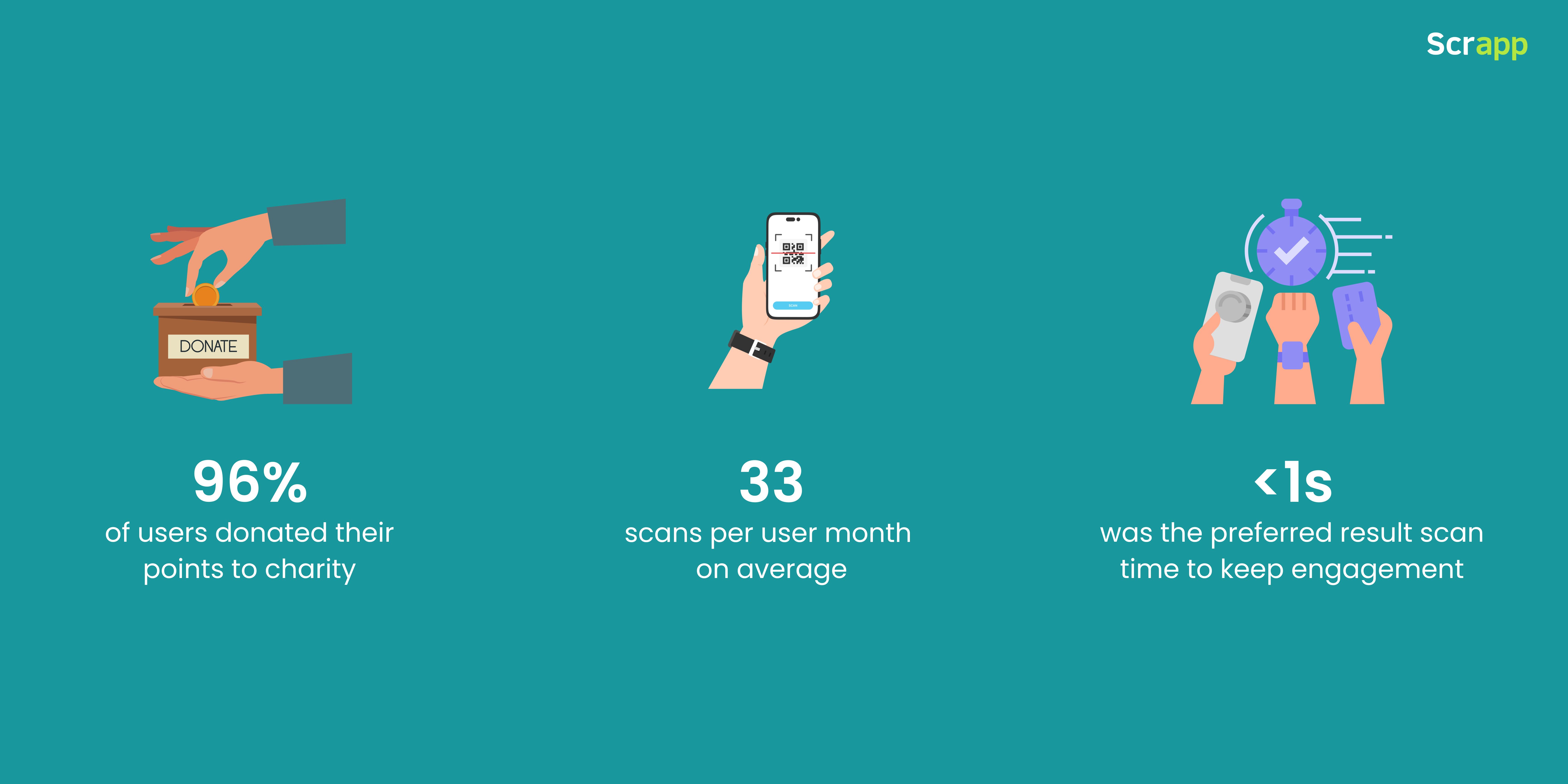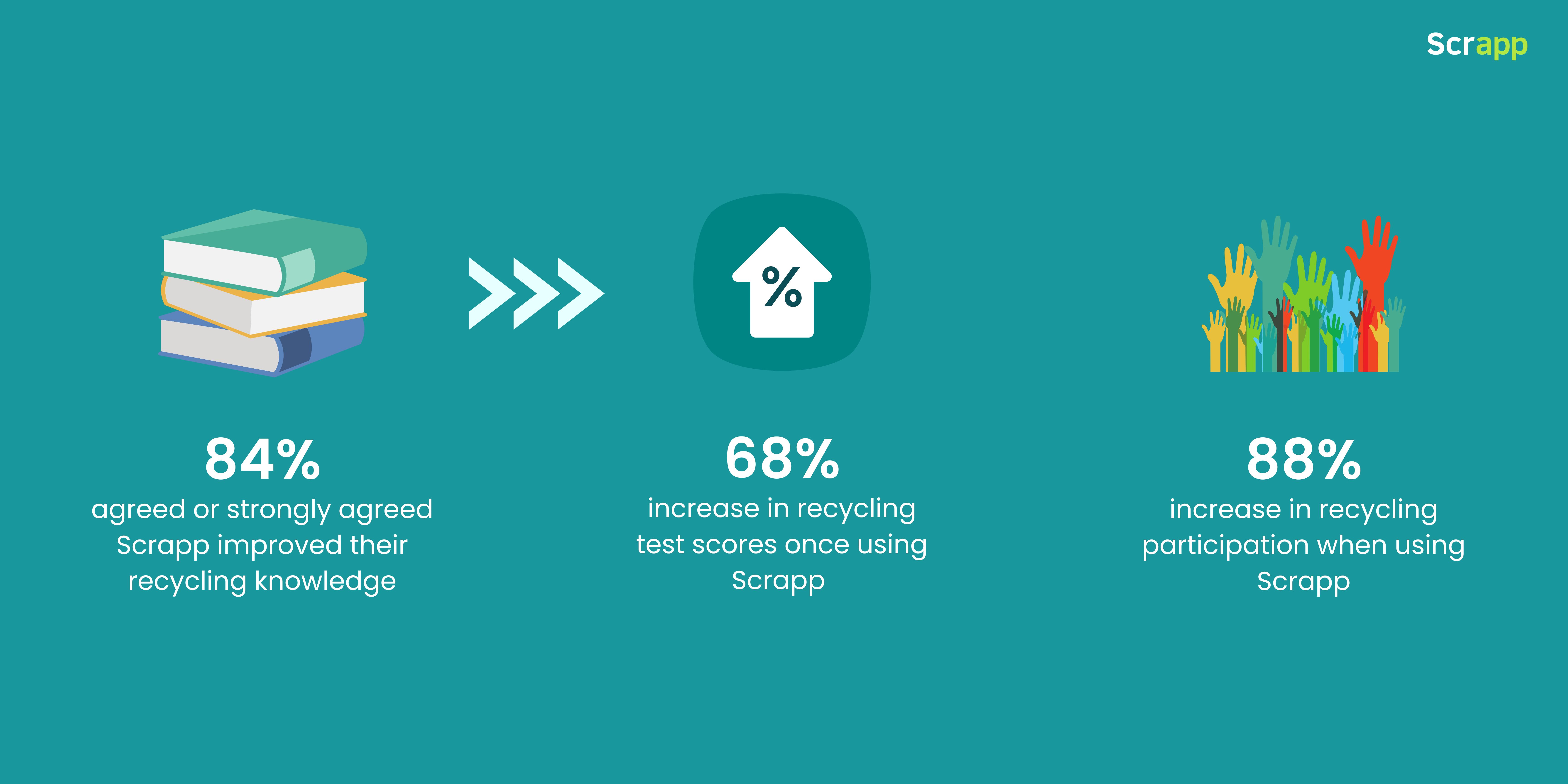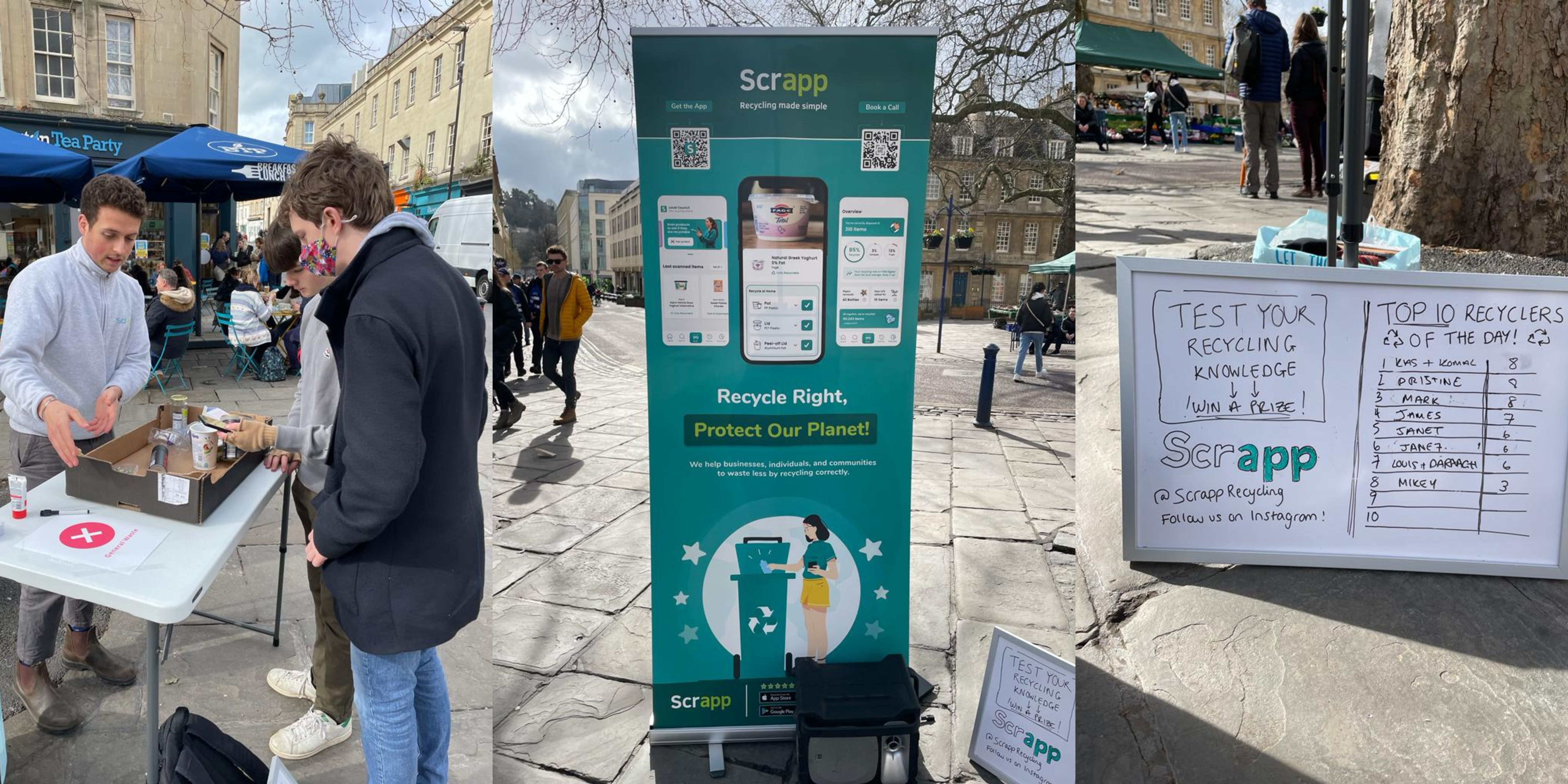Rewards for Recycling: What We Learned After Testing Gamification with 1,000 Users
When we launched the Scrapp mobile app in March 2021, we were convinced we had cracked the code on recycling engagement. Like many startups tackling consumer behavior change, we turned to rewards for recycling, thinking it was the silver bullet to getting more people to recycle. The logic seemed clear: give people points for recycling, let them redeem rewards, and watch recycling rates soar.
After months of testing and interviewing over 1,000 users, and analyzing countless data points, we've learned something counterintuitive: rewards for recycling might actually be counterproductive for long-term behavior change.
We wrote an article on how to gamify your company recycling programs, much of which based on the learnings of this blog post.
The Original Gamification Strategy: Points, Rewards, and Good Intentions
Our initial approach to gamification was straightforward. Every time users scanned their waste through the Scrapp app, they earned points. These points could be redeemed for free sustainable products, goods, or services. The barrier to entry was deliberately low - users only needed to recycle 10 items (roughly half the weekly average) to unlock their first reward.
During our beta testing phase, we tracked detailed metrics that seemed to validate our approach. Users averaged 33 scans per month, and we discovered that keeping result scan times under 1 second was crucial for maintaining engagement. The psychology seemed sound: gamification paired with tangible rewards for recycling would create a positive feedback loop. However, users fatigued and engagement dropped within 4 weeks. From a user perspective, it required a new habit to be formed which had very little value in return.

The Charity Experiment: A Telling Case Study
During our 12-week beta testing phase with 1,000 users, we introduced an interesting feature: users could donate their earned points to charity instead of redeeming them for personal rewards. The results were striking- 96% of users chose to donate their points to charity rather than claim personal rewards.
This outcome hinted at something deeper about human motivation and consumer behavior around environmental actions like recycling. It became clear that utilization was more important than gamification for sustaining long-term engagement.
The Blood Donation Parallel: Why Rewards Backfire
The charity donation data led us to explore parallel studies in behavioral economics, particularly research on blood donation incentives. What we discovered was illuminating: when people are paid to donate blood, there was no change in the number of donations
The reason? Financial incentives tarnish the 'feel-good' factor of doing something bigger than oneself. Payment transforms an altruistic act into a transaction, undermining the intrinsic motivation that drives the behavior.
Recycling falls into the same category. When people recycle, they're not just disposing of waste - they're contributing to planetary health, participating in something larger than themselves. Introducing rewards for recycling risks making this meaningful act feel transactional.
Real-World Testing: The Numbers Don't Lie
To validate our findings beyond the digital realm, we conducted street testing on Bath High Street, UK. We set up a table with 10 different packaging types and asked 20 members of the public to sort them according to current recycling guidelines. The results were eye-opening:
Without Scrapp:
- 40% contamination rate in recycling sorting
- Widespread confusion about proper recycling procedures
With Scrapp:
- 4% contamination rate after using the app
- 36% reduction in contamination levels overall
The impact on user knowledge and behavior was equally impressive:
- 84% of users agreed or strongly agreed that Scrapp improved their recycling knowledge
- 68% increase in recycling test scores after using the app
- 88% increase in recycling participation when using Scrapp

These numbers revealed something crucial: convenience and education trump gamification when it comes to driving sustainable behavior change in recycling. You can see the full report here.

The New Model: Social Gamification in Action
Our current approach to behavior change centers on regular topical questions that engage our community. For example, in June 2025, we ran a poll asking whether pineapple belongs on pizza - 72% of our users voted that it does! While it may seem trivial on the surface, it gets people thinking about waste, and associating involvement with recycling something.
These social features serve multiple purposes:
- They build community around environmental consciousness
- They maintain engagement without creating transactional relationships
- They respect intrinsic motivation while still providing interactive elements
- They generate valuable data about user preferences and opinions
Key Learnings for Consumer Behavior Change
Our journey testing rewards for recycling has yielded several critical insights about consumer behavior and environmental actions:
1. Intrinsic vs. Extrinsic Motivation
Environmental behaviors like recycling are often driven by intrinsic motivation - the satisfaction of doing something meaningful. External rewards can actually undermine this intrinsic drive, leading to decreased long-term engagement.
2. The Transaction Problem
When you introduce rewards for recycling, you risk transforming an altruistic environmental act into a commercial transaction. This psychological shift can diminish the behavior's personal meaning.
3. Social Engagement Over Individual Rewards
Community-building features and social gamification elements maintain engagement without the downsides of reward-based systems. People want to feel part of something bigger, not just earn points.
4. Short-term Spikes vs. Long-term Change
Rewards create impressive short-term engagement spikes but often fail to drive lasting behavior change. Our data showed that convenience and speed (keeping scan times under 1 second) matter more than point accumulation. Sustainable systems focus on building habits and reducing friction rather than delivering immediate gratification.
The Broader Implications for Environmental Apps
Our experience with rewards for recycling reflects broader challenges in environmental technology. Many apps and platforms default to point-based gamification systems with minimal consideration to the psychological complexities of the specific behavior.
The most effective approach to driving recycling behavior change might be the one that doesn't try to "pay" users for their environmental consciousness.
Instead, successful platforms should focus on:
- Building community around shared environmental values
- Providing education that helps users understand their impact
- Creating social connections that reinforce positive behaviors
- Celebrating collective achievements rather than individual point accumulation
What's Next for Scrapp
Since removing rewards for recycling from our platform, we've seen more consistent long-term engagement by building out more high-value features like bin day reminders, that build trust with our platform. Users stick around not because they're earning points, but because they're part of a community that cares about environmental impact.
Our polls and quizzes generate surprising insights. More importantly, these social features maintain the intrinsic motivation that drives meaningful recycling behavior.
The Bottom Line
After testing rewards for recycling with 1,000 users and analyzing years of engagement data, we've learned that the best reward for recycling might be no reward at all.
Environmental behavior change is most sustainable when it's driven by intrinsic motivation and community connection rather than external rewards. While gamification certainly has a role to play in environmental apps, the most effective systems focus on social engagement and collective impact rather than individual point accumulation.
Sometimes the most powerful behavior change strategy is simply getting out of the way and letting people feel good about doing good.
Want to experience social gamification for recycling firsthand? Download Scrapp and join our community of environmentally conscious users who believe that pineapple definitely belongs on pizza—or at least, the 72% of them do.
.jpg)